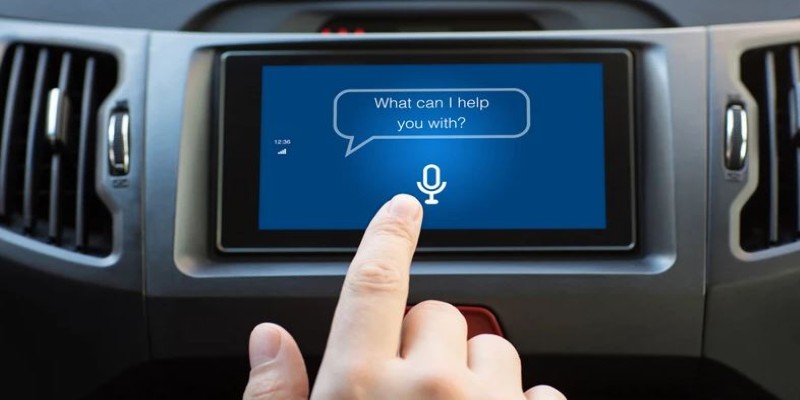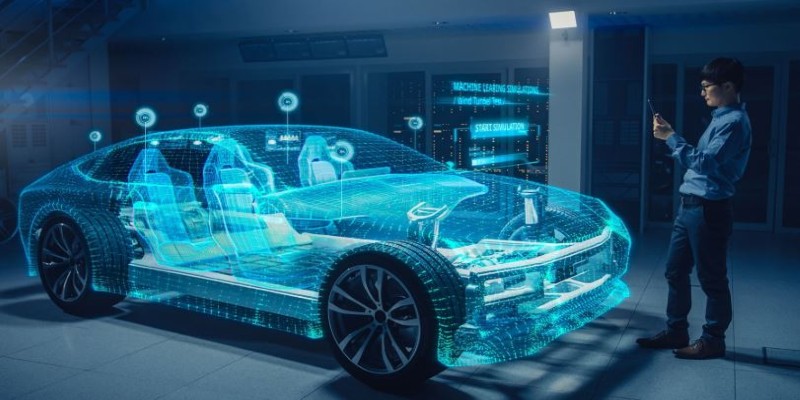Imagine stepping into a car that feels like an extension of yourself—smart, intuitive, and always one step ahead. AI in cars is not a distant dream but a reality that's unfolding before our eyes, transforming mundane commutes into futuristic journeys. This new wave of automotive technology listens, learns, and responds to your driving habits, making each ride safer, smoother, and more enjoyable.
From autonomous capabilities to predictive maintenance and tailored navigation, AI is discreetly changing how we live life on the roads. It is rather like having an informed co-pilot who gets better every passing day to transform normal travel into discovery.
10 Examples of AI Enhancing the Automotive Experience
Explore 10 real-world examples of how AI is being integrated into vehicles, providing a detailed look at the benefits, challenges, and future possibilities in a conversational and simplified manner.
AI and Autonomous Driving
In-car personal assistants change the way drivers interact with their vehicles. Using voice recognition and natural language processing, these AI assistants comprehend voices commanding them, control entertainment, manage climate settings, and even find directions. It acts as a polite co-pilot that minimizes the need for manual input while keeping drivers on the road. These personal assistants discover the idiosyncrasies of an individual while making each trip smoother and more personalized, combining convenience and safety perfectly into the act of driving.
In-Car Personal Assistants

In-car personal assistants transform how drivers interact with their vehicles. Using voice recognition and natural language processing, these AI assistants hear vocal commands, command entertainment, adjust climate settings, and determine directions. They are friendly co-pilots, requiring less manual input by the driver and more focus on the road. By learning people's preferences, personal assistants make every trip a little easier and more customized, merging into the ride while adding a layer of convenience and safety.
Predictive Maintenance
Predictive maintenance uses AI to foresee vehicle issues before they become serious. By constantly monitoring engine performance, tire pressure, and other vital components through integrated sensors, the AI detects early signs of wear. It analyzes data trends and patterns to predict failures, alerting drivers to schedule timely repairs. This approach not only prevents breakdowns but also extends the vehicle’s lifespan and enhances safety. Proactive maintenance reduces unexpected costs and stress, making car ownership more predictable and reliable.
Smart Navigation Systems
Smart navigation systems go beyond simple directions by leveraging AI to optimize routes. They analyze live traffic data, weather conditions, and driver habits to suggest the most efficient paths. The system learns over time, recognizing frequent stops, preferred routes, and even scenic drives. By adapting to real-time changes, these navigation aids save time and reduce stress. They effectively combine data analytics with user preferences to offer personalized, timely, and accurate guidance, making each journey as smooth as possible.
AI Enhanced Safety Features
AI-enhanced safety features boost driving security by using cameras, radar, and sensors to monitor road conditions and detect hazards. Features like automatic emergency braking, lane departure warnings, and collision avoidance react quickly to reduce accident risks, often faster than human reflexes. These systems continuously learn from real-world data, adapting to various driving situations. This constant improvement provides a protective layer, ensuring a safer driving experience for both drivers and passengers.
Voice Control and Entertainment
Voice control systems make in-car entertainment more accessible and enjoyable. Through AI, drivers can change music, adjust climate controls, or inquire about nearby restaurants without taking their hands off the wheel. The technology understands natural language, making interactions smoother and more intuitive. It learns personal music tastes and media preferences, offering tailored suggestions over time. This integration of AI ensures that entertainment and vehicle controls are seamlessly managed, enhancing overall driving pleasure while keeping safety a priority.
Advanced Driver Assistance Systems (ADAS)
Advanced Driver Assistance Systems (ADAS) use AI to offer features like adaptive cruise control, parking assistance, and traffic sign recognition. These technologies monitor surroundings and adjust the car's behavior—such as maintaining safe following distances or assisting in tight parking spots. By processing data from multiple sensors, ADAS reduces driver fatigue and potential errors. Acting as a supportive co-pilot, these systems make complex driving tasks simpler and safer, enhancing the driving experience without taking full control away from the human driver.
Manufacturing and Design

AI's role extends beyond the road into car manufacturing and design. It optimizes production lines, predicts quality issues, and streamlines supply chains. Machine learning models analyze vast amounts of production data to identify defects early and suggest improvements. During the design phase, AI can simulate material performance and vehicle aerodynamics, leading to safer, more efficient cars. This integration of AI reduces waste, speeds up innovation, and ensures higher-quality vehicles, ultimately benefiting both manufacturers and consumers.
AI in Car Security
As cars become more connected, AI helps bolster vehicle cybersecurity. It monitors internal network traffic, detects unusual patterns, and stops potential cyber threats before they escalate. This continuous learning system updates its defense mechanisms based on the latest threat data, much like antivirus software for cars. By protecting sensitive data and preventing unauthorized control of vehicle functions, AI ensures that both the driver's privacy and the car's operational integrity remain intact, making connected vehicles safer from digital attacks.
The Road Ahead: The Future of AI in Cars
The future of Automotive AI promises smarter, more connected vehicles. As AI learns from driving data, it will improve safety, personalization, and efficiency. Fully autonomous cars may soon communicate with each other and infrastructure, reducing traffic and accidents. Personalization will extend to settings like seating and entertainment. While challenges in ethics and regulation remain, the ongoing evolution of AI in cars will revolutionize travel, making it safer and more efficient.
Conclusion
AI in cars is revolutionizing the automotive industry, enhancing safety, convenience, and driving experiences. From autonomous driving and smart navigation to predictive maintenance and advanced safety features, AI is making vehicles smarter and more responsive. As this technology continues to evolve, it holds the promise of even more personalized and efficient driving. While challenges remain, the integration of AI in cars is undoubtedly shaping the future of transportation, making journeys safer and more enjoyable for all.



